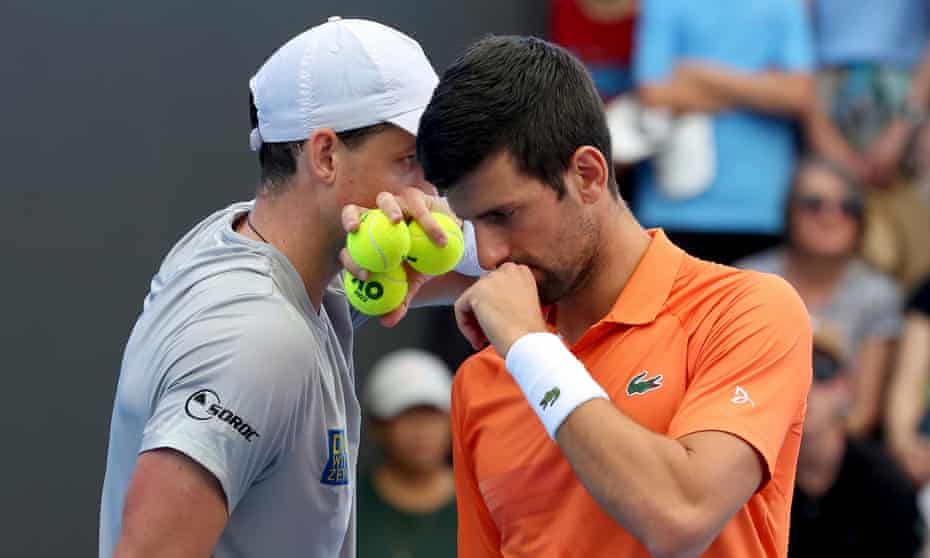Novak Djokovic, one of tennis’ greatest players, and his fellow Canadian player Vasek Pospisil have made headlines with a bold and contentious lawsuit accusing the sport’s governing bodies of running a “cartel.” The two players have taken legal action against the ATP (Association of Tennis Professionals), the WTA (Women’s Tennis Association), and the ITF (International Tennis Federation), claiming that these organizations are engaging in anti-competitive behavior that restricts the rights of players and undermines their ability to make a living from the sport.
The lawsuit is significant, as it marks an unprecedented challenge to the governance of professional tennis and could have far-reaching implications for how the sport is managed in the future. Djokovic and Pospisil, both prominent figures in the tennis world, are no strangers to controversy, but their decision to take legal action is an extraordinary move that underscores their growing frustration with the existing structures of power within the sport.
### What’s at the Core of the Lawsuit?
At the heart of the lawsuit is the claim that tennis’ governing bodies, including the ATP, WTA, and ITF, operate as a cartel, limiting players’ ability to make independent decisions regarding their careers. Djokovic and Pospisil allege that these organizations work together to control the sport’s finances, including tournament prize money and broadcasting deals, in a way that disproportionately benefits the top-ranked players while leaving many others struggling to survive financially.
One of the main points of contention in the lawsuit is the division of prize money. Djokovic and Pospisil argue that while the top players in the sport benefit from multi-million-dollar deals, the majority of players, particularly those ranked outside the top 100, receive a fraction of the revenue generated by the sport. The lawsuit alleges that the governing bodies have failed to ensure fair distribution, instead consolidating power and wealth in the hands of a few select individuals.
Moreover, Djokovic and Pospisil have criticized the lack of transparency in the decision-making processes of these organizations, accusing them of operating without sufficient player representation or input. The lawsuit points to the role of the ATP and WTA in setting tournament schedules, prize money allocations, and other major decisions that impact players’ careers. Djokovic and Pospisil contend that these decisions are made with little regard for the players’ needs, often without giving them an opportunity to voice their concerns or influence the outcome.
### The Role of the PTPA
Both Djokovic and Pospisil have long been vocal advocates for greater player representation. In 2020, the two players co-founded the Professional Tennis Players Association (PTPA), an independent organization aimed at representing the interests of male and female professional tennis players. The PTPA was created in response to what they perceived as a lack of meaningful player input within the ATP and WTA. The lawsuit represents a further extension of their efforts to reshape the power dynamics in the sport.
The PTPA’s creation has been controversial in itself, as it has been seen by some as an attempt to challenge the authority of the existing governing bodies. The ATP, in particular, has been critical of the PTPA, arguing that the organization is dividing the players rather than uniting them. However, Djokovic and Pospisil see the PTPA as an essential tool for reforming tennis and ensuring that players have a seat at the table when decisions are made about the sport’s future.
### Djokovic’s Stance on Player Rights
Novak Djokovic has been a leading figure in advocating for players’ rights. His outspoken nature and willingness to challenge authority have made him both a respected and polarizing figure within the tennis community. Throughout his career, Djokovic has raised concerns about the disparity between the top players and the rest of the field, particularly when it comes to the financial rewards of the sport.
Djokovic’s stance on player rights was further highlighted during the COVID-19 pandemic, when he led efforts to organize exhibition events and called for greater player solidarity during a time of financial uncertainty. He has consistently argued that the tennis ecosystem is not designed to benefit the majority of players, and his lawsuit is the latest manifestation of this belief.
By taking legal action, Djokovic is hoping to bring attention to what he perceives as a system that is not only unfair to players but also damaging to the long-term health of the sport. He is calling for a more equitable distribution of resources and greater transparency in the decision-making processes of the sport’s governing bodies.
### Pospisil’s Support and Shared Vision
Vasek Pospisil, who has been an ally to Djokovic in the push for greater player representation, is also deeply invested in the success of the PTPA. Pospisil, like Djokovic, has been a vocal critic of the ATP’s management and has frequently discussed the struggles of lower-ranked players. He has argued that the current system creates an unsustainable situation for players outside the top 100, who often struggle to cover their expenses due to the low prize money offered at lower-tier tournaments.
Pospisil’s support for the lawsuit is indicative of his long-standing frustration with the way professional tennis is governed. In addition to his advocacy for player rights, Pospisil has also been involved in efforts to address issues like the uneven scheduling of tournaments, the lack of support for players who fall outside the elite rankings, and the lack of opportunity for players to influence the decisions that affect their careers.
### Implications for the Future of Tennis
The lawsuit filed by Djokovic and Pospisil has the potential to significantly reshape the landscape of professional tennis. If successful, it could lead to a major overhaul of how the sport is governed, how revenue is distributed, and how player interests are represented. It could pave the way for greater collaboration between players and the governing bodies, ensuring that decisions made at the top levels of the sport reflect the needs and concerns of the entire tennis community.
However, the legal battle is unlikely to be straightforward. The ATP, WTA, and ITF are powerful organizations with significant financial and legal resources at their disposal. They are likely to vigorously defend their practices and will seek to counter the claims made by Djokovic and Pospisil. The outcome of the lawsuit will depend on how the court evaluates the claims of anti-competitive behavior and the arguments made by both sides.
Even if the lawsuit does not result in immediate changes, the fact that two high-profile players are challenging the status quo sends a powerful message to the governing bodies of tennis. It highlights a growing frustration among players and signals that the current system may need to be reexamined to ensure that it remains fair and sustainable for everyone involved.
### Conclusion
Novak Djokovic and Vasek Pospisil’s lawsuit against the governing bodies of tennis is a bold and significant step in the ongoing struggle for greater player rights and fairness in the sport. While the legal battle may take time to resolve, the move highlights deep dissatisfaction with the way tennis is run, particularly when it comes to how resources and decision-making power are distributed. With the backing of the PTPA and the growing momentum behind their cause, Djokovic and Pospisil are signaling that the future of professional tennis could look very different, with a stronger focus on player welfare and a more equitable system for all.






Leave a Reply